While I’m almost all out of the "feather business" for the fall, there’s still plenty of fur to keep things hoppin’.
Let’s see...Toodles the bluebird no longer visits, and Chip, the probable blue grosbeak, died suddenly and inexplicably. The wound on his head hadn’t healed after two weeks, and he went from a chipper, noisy, happy little fellow one Friday morning to a dull, listless, lethargic bird who was unable to perch by early that afternoon. I suspected a brain tumor, since there was a knot under the wound - not an abscess, as he continually ripped the scab off and it bled freely when he did so. Anyway, I called Jim Hobby at Smalley’s and discussed the situation with him. Jim agreed that something was seriously wrong and we decided to euthanize, but before I could get Chip to the clinic, he’d died on his own. Again, these sorts of frustrating, mysterious things happen in wildlife rehab. Knowing that doesn’t stop the second-guessing, but sometimes even when a rehabber’s doing everything right, the animal’s just not gonna make it. It’s an unhappy fact that we have to learn to live with.
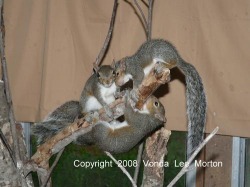
Heloise, Abelard and Hildegard are growing by leaps and bounds and should be ready for release in about three weeks or so.
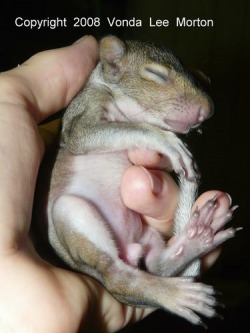
The Wee One has been named Eliza and has about a week to a week and a half before her little eyes open. See how much she’s grown?!
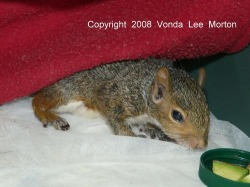
Another squirrelly addition is Spaz, who lives up to - or would that be down to? - her name. You have to see her eat to understand - the girl acts like each feeding is her first and last!
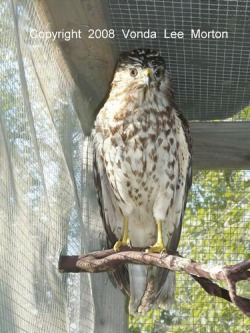
In a tale fit for the record books, a young red shoulder hawk was pinned by a Dachshund last week, bruising but not breaking his wing. The lady who owned the dog said she was out walking her dogs, heard the "whoosh" of wings, and turned to see the Dachshund pinning the hawk! He’s still with me while we wait for the bruising and tenderness to go down enough for him to feel like flying.
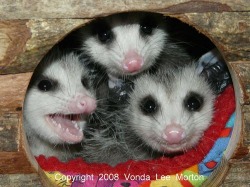
I also have three possums who are about a month away from release. They’d been fed an inappropriate diet for about month before I got them, so they were rail-thin when they came in. They’ve made up for lost time and nutrition with a proper diet and have grown like weeds.
There are those people who despise possums because they’re "nasty" and they hiss and snarl - in fact, these three have been nicknamed Hissy, Pissy and Snarly - but the fact is, possums are invaluable little critters. They eat carrion, rotten fruit, nasty little creepy-crawlies - all sorts of stuff we fastidious humans would prefer not to think about. They’ve been described as "Nature’s little garbage collectors," which I think is a highly appropriate summary of the near-sighted little rascals. Their hygiene may be somewhat lacking, but these critters have survived for millions of years virtually unchanged, so they must be doing something right! They’re also highly disease-resistant: body temp’s too low to harbor the rabies virus; can survive a rattlesnake bite; can eat other animals who died of various diseases without contracting the illnesses themselves...they ain’t pretty, not by a long shot, but they ARE so ugly they’re cute!
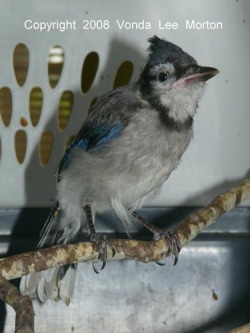
I also have a late-hatch blue jay who’d been fed a massively inappropriate diet for three weeks before I received him: bologna and rice for the first week and mealworms and suet for the next two. He also had diarrhea when he came in, poor baby. He has stress bars all in his tail feathers from the malnutrition, and because he was attacked by a dog who ripped out most of the primary and secondary feathers on his left wing, he has real difficulty flying. Those feathers won’t be replaced until he molts, so he’s going to have to overwinter with me. He hasn’t acquired a name yet.
I also had a pinky squirrel come in Friday night, after being fed Hartz Just Born formula for a week, during which time he aspirated the formula and developed severe pneumonia. He died just hours after I received him, even though I started antibiotics immediately. It was too late to help the poor little fellow.
First off, let me state for the record that Hartz formulas of ANY kind are NOT nutritionally balanced for wildlife. Secondly, pinkies must be fed very carefully by someone who knows what they’re doing in order to avoid aspiration. Just one or two drops of formula in that baby’s lungs and within hours you can have a fatal case of pneumonia already developing. If you truly care about these babies, when you find them...CALL A LICENSED REHABBER!!!
Folks, instances like this and those of the possums and the blue jay should emphasize the need to locate a licensed rehabber as soon as possible upon discovering orphaned/injured wildlife. Quite frankly, it’s a miracle that any of these four animals survived, given the diets they were fed, and the poor pinky didn’t have a chance by the time I got him - and that doesn’t even touch on the issue of the illegality of possessing the animals without a license. As I’ve said before, there’s a REASON wildlife rehabbers have to be licensed: we’ve taken the time to learn the proper ways to handle wildlife, the diets each species should receive, how to properly prepare the animals for release, how to treat injuries/illnesses, and so forth.
You know, most vet clinics know the rehabbers in their area and will refer you to them - all you have to do is call. Check with your local animal shelter if you have no vets nearby. And in Georgia you can always call the DNR hotline 24/7 at 1-800-241-4113 for the name and number of the licensed rehabber nearest you.
Bottom line - don’t let your inaction or ignorance cause the needless suffering and/or death of some poor animal that a licensed wildlife rehabber would have a good chance at saving. There’s just no excuse for that.
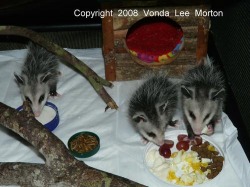
 RSS Feed
RSS Feed
